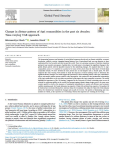Ghosh B., Ghosh A. (2025). Change in dietary pattern of agri commodities in the past six decades: time-varying VAR approach. Global Food Security, 01/03/2025, vol. 44, p. 100823.
https://doi.org/10.1016/j.gfs.2024.100823
https://doi.org/10.1016/j.gfs.2024.100823
| Titre : | Change in dietary pattern of agri commodities in the past six decades: time-varying VAR approach (2025) |
| Auteurs : | B. Ghosh ; A. Ghosh |
| Type de document : | Article |
| Dans : | Global Food Security (vol. 44, March 2025) |
| Article en page(s) : | p. 100823 |
| Langues : | Anglais |
| Langues du résumé : | Anglais |
| Catégories : |
Catégories principales 08 - ALIMENTATION ; 8.1 - Consommation Alimentaire. ComportementThésaurus IAMM CONSOMMATION ALIMENTAIRE ; PRATIQUE ALIMENTAIRE ; REGIME ALIMENTAIRE ; PRODUIT AGRICOLE ; SECURITE ALIMENTAIRE |
| Résumé : | The burgeoning frequency and intensity of varied global exogenous shocks such as climate variability, economic slowdowns, conflicts, scarcity, changing demand pattern, loss of Agricultural land, new age diseases etc have undermined the food security and diets around the world. There is a growing consensus of nutrition transition paving its way towards convergence of global diets. Our study aims to investigate the significant changes in the global dietary pattern with the plausible reasons for the underlying changes. We analysed data for 14 Agri-commodities across 171 countries for a period of 63 years (1960?2023) from the Pink Sheet of World Bank Commodity details. We have divided the time period into six sub-samples each a decade apart. We have employed the Time Varying VAR method to study the frequency of shock emitting events to determine the significant dietary changes. Our results suggest the periodicity in shock emitting pattern of the Agri-commodities. All the sub-samples exhibit extreme spillover effect throughout. This underscores the fundamental vulnerability of the Agri-commodities, as far too many uncorrelated events impact the Agri-commodity ecosystem. The results highlight the importance of the ?3R Strategy? (suggested by the University of Oxford) consisting resist, recover & reorient for achieving stability in the overall food systems against climate change (region wise & for some cases country specific) as well as the measures of sustainable intensification to ensure soil efficiency and economic viability simultaneously. We found, Indonesia (an exporter of Palm Oil) and Brazil (an exporter of Groundnut Oil & Chicken) have reoriented themselves, whereas China (for Groundnut Oil), India (for Palm Oil) & Sub-Saharan Africa (for Chicken) have resisted the changes and on path of recovery. The pattern of dominating Agri commodities is evident, as the exporters are ?reorienting? whereas the importers are ?resisting & recovering?. |
| Cote : | Réservé lecteur CIHEAM |
| URL / DOI : | https://doi.org/10.1016/j.gfs.2024.100823 |







